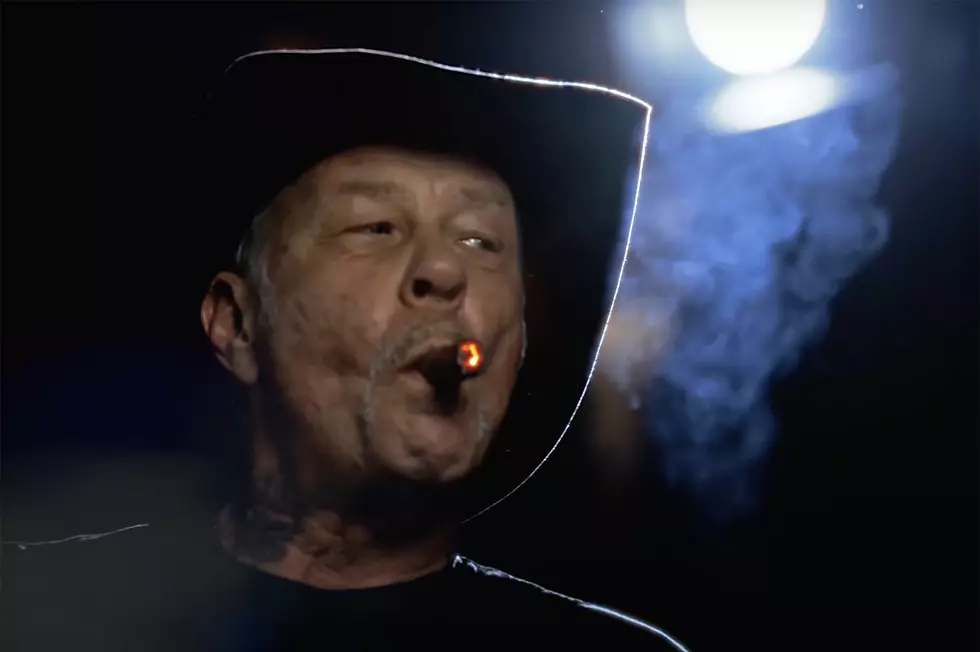
30 Years Ago: Metallica Wake the Mainstream With ‘Enter Sandman’
Heading into the '90s on the heels of their greatest success to date, the prog-metal masterpiece … And Justice for All and its crossover single “One,” Metallica were determined to go to the opposite end of the spectrum by making songs that were tighter, less complicated and shorter. Out of the gate they achieved that goal with the lead single off their self-titled 1991 album, “Enter Sandman,” which was released July 29, 1991.
To help streamline the process going into the new record, Metallica enlisted producer Bob Rock, who at that point was best known for helming the Cult’s Sonic Temple and Motley Crue’s landmark Dr. Feelgood. One of the first changes he made from their previous efforts was to have the entire band in the studio during the composition and recording. Though Rock wasn’t a fan of Metallica beforehand, he did know their reputation as a live act and wanted to capture that energy on what came to be known as the Black Album.
“Enter Sandman” wasn’t just the lead single; it also kicked off and was the first song written for the record, with the genesis in a guitar riff Kirk Hammett came up with at home in his bedroom in the middle of the night. Although the grunge scene was a bit away from exploding, Metallica were already tapped into what was happening in Seattle, and Hammett in particular was inspired by Soundgarden’s 1989 LP Louder Than Love for the riff he created. When he brought it to the studio, drummer Lars Ulrich suggested he repeat the opening hook four more times.
“The whole song – the progression, the chords, everything – comes out of that riff,” Ulrich said in the 33 1/3 book series volume about the LP, Metallica. “The song is a one-track pony in that respect. We jumped into the album by writing and playing the simplest song.”
Yet it was the last song James Hetfield wrote lyrics to for the Black Album. The band had been floating the title “Enter Sandman” around since the mid-'80s, but coming up with the words to go with the track was another story. Initially, the singer wrote about crib death; the line “off to never never land” was originally “disrupt the perfect family.” While no one would ever accuse Metallica of venturing into happy subject matter, even that was a bit too dark for the rest of the band. They made it Rock’s job to suggest to Hetfield to lighten up a bit.
Watch Metallica's 'Enter Sandman' Video
“Nobody had ever talked to James about his lyrics, so they told me I had to do it,” the producer told Uncut. “Here’s this guy who’s basically Mr. Grouchy, the Mighty Hetfield. But I just said, ‘You’re selling the song short. It’s so easy to just go to simple stuff like that, but it’s harder to come up with something good that means something.’ I think that was the beginning of trying to give James the confidence to reach for more.”
At first, Hetfield wasn’t receptive to the questioning of his lyrics. He eventually came around, but not until levying a strong protest.
“I was like, ‘Fuck you! I’m the writer here!’” he told Guitar World. “That was the first challenge from someone else, and it made me work harder.”
The reconfigured lyrics took the folklore of the Sandman, who, in Scandinavian mythology, is said to help put children to sleep at night by sprinkling magical sand onto their eyes to ensure beautiful dreams, and flips it around completely by turning it into a nightmare scenario.
“I wanted more of the mental thing where this kid gets manipulated by what adults say,” Hetfield explained to Uncut. “You know when you wake up with that shit in your eye? That's supposedly been put in there by the Sandman to make you dream. So the guy in the song tells this little kid that, and he kinda freaks. He can't sleep after that and it works the opposite way. Instead of a soothing thing, the table's turned."
Building the song around Ulrich’s propulsive drums (which, in another move by Rock, were brought to the forefront on the Black Album) and an irresistible, arena-ready chorus helped turn “Enter Sandman” into worldwide smash. It was the opener for each show of the exhaustive Wherever We May Roam trek that began in August 1991 and went through December of the following year.
As a lead single – going against Rock’s suggestion of “Holier Than Thou” – it was about as far as Metallica could go from their original thrash sound without completely alienating an early fan base already suspicious of the MTV play they had received with “One.” But there’s no denying the fact that the song and the video that premiered the day after the single’s release propelled the band into the mainstream, where they’ve resided ever since.
Metallica Albums Ranked
More From Ultimate Classic Rock









